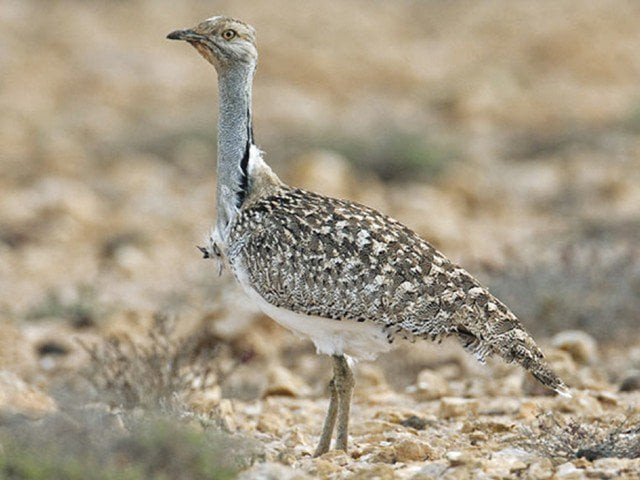Houbara bustard: SC reserves ruling on hunting ban appeals
The top court’s five-judge larger bench heard the case for three days

PHOTO: AFP
Tiloor is prized by hunters from the Gulf States, who flock to Pakistan every winter. The government grants special permits for the Middle Eastern sheikhs on ‘diplomatic grounds’ as they bring ‘investment to the social sector’.
The Supreme Court’s three-judge bench, headed by former chief justice Justice Jawad S Khawaja on August 19, put a complete ban on the hunting of the bird. Later, several petitioners – including federal, Punjab, Sindh and Balochistan governments – filed review petitions in the apex court.
On January 5, Chief Justice Jamali formed a five-judge larger bench also including Justice Mian Saqib Nisar, Justice Iqbal Hameed Ur Rehman, Justice Umar Ata Bandial and Justice Qazi Faez Isa to hear the review petitions.
This five-judge larger bench heard the case for three consecutive days and later reserved its judgment.
During the hearing, Attorney General Salman Aslam Butt told the bench that the federal government was not against the August 19 verdict but wanted to allow some form of ‘sustainable’ hunting.
Sindh’s counsel Farooq H Naek on Thursday contended before the apex court that hunting of Tiloor was intolerable and excruciating for the neighbouring country, which did not want to see Pakistan develop. Punjab’s Additional Advocate General (AAG) Razaq A Mirza also opposed the ban.
Likewise, the Balochistan government requested the apex court to allow, what it called, ‘sustainable hunting’ of the migratory bird under a strict code of conduct.
However, the Khyber-Pakhtunkhwa (K-P) government did not make any request regarding the lifting of ban on the hunting.
During the hearing on Friday, Kamran Mutraza counsel of Malik Salim, who had approached Balochistan High Court against the hunting, raised objection over the constitution of larger bench in this case.
Published in The Express Tribune, January 9th, 2016.



















COMMENTS
Comments are moderated and generally will be posted if they are on-topic and not abusive.
For more information, please see our Comments FAQ